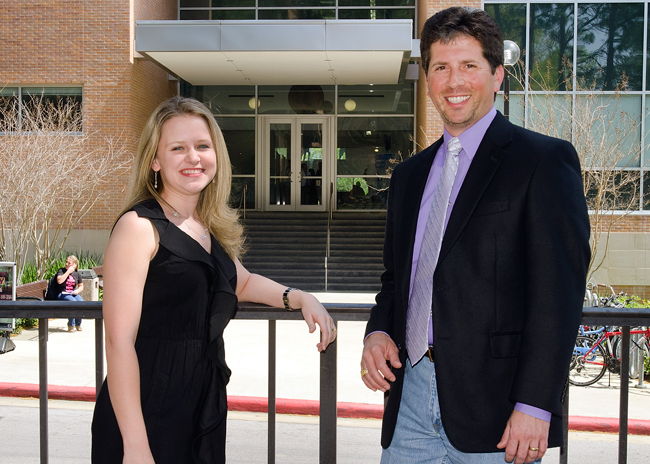Center Combats Rural 'Brain Drain' With Outreach Programs
March 19, 2013
SHSU Media Contact: Jennifer Gauntt
Story by: Amy Barnett
 |
| SHSU Center for Rural Studies associate director Cheryl Hudec and director Gene Theodori work to build, strengthen and maintain Texas's rural communities through a number of research and outreach programs that they hope will have an impact on the longevity of the state's small towns, as well as legislation that might affect the citizens who live there. —Photo by Brian Blalock |
It’s becoming a growing concern in rural Texas. Youth who are considered potential future leaders leave their hometowns, head off for college and never look back. They set their sights on larger, more promising cities, hoping to create a life of success and great fortune, because in rural Texas, such a life doesn’t exist.
At least that’s what they’ve been taught, some from a very early age.
“I travel the state a lot and meet with a lot of economic development corporation directors, chamber persons and elected officials, and the most common thing I hear is that their youth are leaving and they’re not coming back,” said Cheryl Hudec, associate director of the Center for Rural Studies at SHSU.
“That’s a real problem, and not just on the economic side of things, because they need those people to create jobs; but, also on the social side of things when you’re talking about leadership in the community to help solve the problems that rural places face.”
So where do these rural Texas communities turn for help when trying to halt what is often referred to as a rural brain drain? Until 2008, there were very few places. But that year Sam Houston State University’s department of sociology created the Center for Rural Studies.
“Other states are so far ahead of Texas when it comes to rural initiatives and rural policy, and so this is our first attempt to replicate the success they have,” Hudec said.
Hudec; the center’s director, SHSU sociology professor and department chair Gene Theodori; and about 40 other faculty and staff across SHSU are dedicated to not only playing catch-up to many other states, but finding ways to become a leader in rural initiatives.
“It’s frustrating that we are so far behind, but it is also very exciting because the center gets to do things that aren’t heard of,” Hudec said. “We can do anything we want because there is such a need out there and such a niche to be filled.”
Hudec and her colleagues are working to fill that niche with several different programs aimed at aiding small town, rural communities. One such program, the Texas Rural Internship, sends urban college students to small towns for a summer to gain a better understanding of rural life.
he students live with host families and get involved with the daily activities of the community, including the town government and local businesses.
“It’s great for the students because they come back with a better perception of rural life, and it’s great for the communities in that they get an outsider’s view of their towns and maybe some new ideas they had never thought of before,” Hudec said.
The Texas Rural Internship program, which is conducted in collaboration with the Texas Department of Agriculture, has completed four years, allowing more than 30 students to participate.
The program successfully addresses the misperception urban students may have of rural Texas, but what about the rural students who are fleeing their small communities?
 |
| Participants from last year's inaugural Community-Youth Development Program sit outside the Lee County Courthouse. The program will return to Giddings this summer for its second year, working with Giddings High School seniors through an internship program that allows students to participate in the inner workings of rural community and government life. In addition, the center will recruit students from five other locations to work in their home towns. —Submitted photo |
Hudec and her colleagues are answering that concern with the Community-Youth Development Program, the state’s “timely and salient” attempt to address the rural brain drain, according to Theodori.
“This is where the research and the outreach of the center come together. Research is saying the No. 1 reason that youth leave is because they have the perception that they don’t have real opportunities in their hometowns,” she said. “The idea behind this program is to accomplish three things: first, educate youth on the operatives of rural communities so they better understand it; second, engage them, and third, get the communities to rethink their investment in the youth.”
The Center for Rural Studies chose the town of Giddings in Lee County to host the first Community-Youth Development Program. With the help of the Giddings Economic Development Corporation, the Workforce Solutions Rural Capital Area and Giddings High School, eight students between their junior and senior year of high school were selected to take part in paid internships in their town.
“We wanted to catch them before they were in their senior year because at that point they are ready to leave,” said Hudec.
The students were asked what type of careers they were interested in and then paired up with participating businesses and county offices. The summer internships opened a variety of doors: one student worked in the public library, another was hired to work in the county judge’s office and another worked at a youth center.
Before the internships started, Hudec sat down with the students and asked them, “How many of you want to come back and live in Lee County or in Giddings?”
They all raised their hands.
But when she asked, “How many of you think you can?” only one student kept her hand up.
Hudec realized she and participants in Lee County had their work cut out for them.
The program started with a three-day leadership camp and a scavenger hunt that led the students through many of the buildings in downtown Giddings. Students were encouraged to use critical-thinking when analyzing community issues. They received leadership education and training and helped develop a community project. After a summer of hard work, learning and networking with residents, students had new opinions about building futures in their home town.
“One student said, ‘I didn’t realize there were so many good people in the community.’ Another one said, ‘I didn’t realize this place was so busy,’” Hudec said. “I even heard, ‘this community is so diverse;’ I was amazed by that answer.”
But what was most profound to Hudec was that the students did gain a new perception of their community by the end of the internships. Not only did they want to return to their town after getting their degrees, they now feel they can do it and make a good living.
“They now know there are opportunities for them in their rural town; they know the people, they are more attached and more engaged, so we feel this program was a great success,” Hudec said.
In August, the students and their parents joined all of the organizations that were involved with the CYDP for a banquet celebrating their success.
This year the Center for Rural Studies will return to Lee County and will also take on five new places.
Hudec believes it will be a huge undertaking, but a necessary step as Texas continues playing catch-up in small town initiatives.
Until then, Hudec and her colleagues are analyzing data from the first Texas Rural Survey, which is an attempt to gain more details about rural Texas towns, information not included in the U.S. Census.
It’s a tall order but will take the Center for Rural Studies a step closer to meeting its ultimate goal: becoming the authority on rural Texas.
“That would be profound. We want to not only be the place where academics can go, but also policy makers and local officials. We want to be the source for all the information they need, including programs and technical assistance; we want to become that entity, and we are slowly getting there.”
- END -
This page maintained by SHSU's Communications Office
Associate Director: Julia May
Manager: Jennifer Gauntt
Located in the 115 Administration Building
Telephone: 936.294.1836; Fax: 936.294.1834
Please send comments, corrections, news tips to Today@Sam.edu.

 SamWeb
SamWeb My Sam
My Sam E-mail
E-mail

